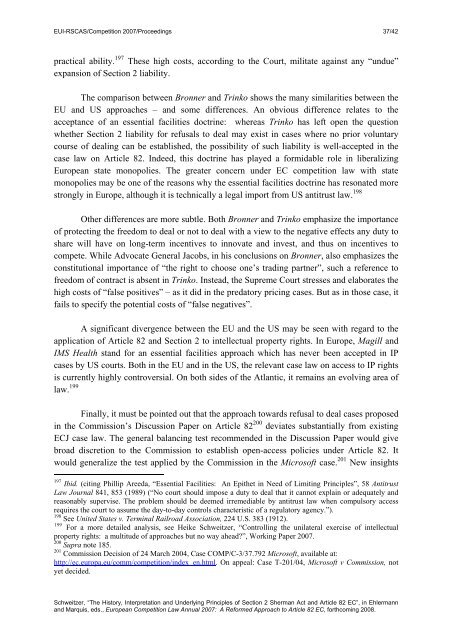The History, Interpretation and Underlying Principles of Section
The History, Interpretation and Underlying Principles of Section
The History, Interpretation and Underlying Principles of Section
You also want an ePaper? Increase the reach of your titles
YUMPU automatically turns print PDFs into web optimized ePapers that Google loves.
EUI-RSCAS/Competition 2007/Proceedings 37/42<br />
practical ability. 197 <strong>The</strong>se high costs, according to the Court, militate against any “undue”<br />
expansion <strong>of</strong> <strong>Section</strong> 2 liability.<br />
<strong>The</strong> comparison between Bronner <strong>and</strong> Trinko shows the many similarities between the<br />
EU <strong>and</strong> US approaches – <strong>and</strong> some differences. An obvious difference relates to the<br />
acceptance <strong>of</strong> an essential facilities doctrine: whereas Trinko has left open the question<br />
whether <strong>Section</strong> 2 liability for refusals to deal may exist in cases where no prior voluntary<br />
course <strong>of</strong> dealing can be established, the possibility <strong>of</strong> such liability is well-accepted in the<br />
case law on Article 82. Indeed, this doctrine has played a formidable role in liberalizing<br />
European state monopolies. <strong>The</strong> greater concern under EC competition law with state<br />
monopolies may be one <strong>of</strong> the reasons why the essential facilities doctrine has resonated more<br />
strongly in Europe, although it is technically a legal import from US antitrust law. 198<br />
Other differences are more subtle. Both Bronner <strong>and</strong> Trinko emphasize the importance<br />
<strong>of</strong> protecting the freedom to deal or not to deal with a view to the negative effects any duty to<br />
share will have on long-term incentives to innovate <strong>and</strong> invest, <strong>and</strong> thus on incentives to<br />
compete. While Advocate General Jacobs, in his conclusions on Bronner, also emphasizes the<br />
constitutional importance <strong>of</strong> “the right to choose one’s trading partner”, such a reference to<br />
freedom <strong>of</strong> contract is absent in Trinko. Instead, the Supreme Court stresses <strong>and</strong> elaborates the<br />
high costs <strong>of</strong> “false positives” – as it did in the predatory pricing cases. But as in those case, it<br />
fails to specify the potential costs <strong>of</strong> “false negatives”.<br />
A significant divergence between the EU <strong>and</strong> the US may be seen with regard to the<br />
application <strong>of</strong> Article 82 <strong>and</strong> <strong>Section</strong> 2 to intellectual property rights. In Europe, Magill <strong>and</strong><br />
IMS Health st<strong>and</strong> for an essential facilities approach which has never been accepted in IP<br />
cases by US courts. Both in the EU <strong>and</strong> in the US, the relevant case law on access to IP rights<br />
is currently highly controversial. On both sides <strong>of</strong> the Atlantic, it remains an evolving area <strong>of</strong><br />
law. 199<br />
Finally, it must be pointed out that the approach towards refusal to deal cases proposed<br />
in the Commission’s Discussion Paper on Article 82 200 deviates substantially from existing<br />
ECJ case law. <strong>The</strong> general balancing test recommended in the Discussion Paper would give<br />
broad discretion to the Commission to establish open-access policies under Article 82. It<br />
would generalize the test applied by the Commission in the Micros<strong>of</strong>t case. 201 New insights<br />
197 Ibid. (citing Phillip Areeda, “Essential Facilities: An Epithet in Need <strong>of</strong> Limiting <strong>Principles</strong>”, 58 Antitrust<br />
Law Journal 841, 853 (1989) (“No court should impose a duty to deal that it cannot explain or adequately <strong>and</strong><br />
reasonably supervise. <strong>The</strong> problem should be deemed irremediable by antitrust law when compulsory access<br />
requires the court to assume the day-to-day controls characteristic <strong>of</strong> a regulatory agency.”).<br />
198 See United States v. Terminal Railroad Association, 224 U.S. 383 (1912).<br />
199 For a more detailed analysis, see Heike Schweitzer, “Controlling the unilateral exercise <strong>of</strong> intellectual<br />
property rights: a multitude <strong>of</strong> approaches but no way ahead?”, Working Paper 2007.<br />
200 Supra note 185.<br />
201 Commission Decision <strong>of</strong> 24 March 2004, Case COMP/C-3/37.792 Micros<strong>of</strong>t, available at:<br />
http://ec.europa.eu/comm/competition/index_en.html. On appeal: Case T-201/04, Micros<strong>of</strong>t v Commission, not<br />
yet decided.<br />
Schweitzer, “<strong>The</strong> <strong>History</strong>, <strong>Interpretation</strong> <strong>and</strong> <strong>Underlying</strong> <strong>Principles</strong> <strong>of</strong> <strong>Section</strong> 2 Sherman Act <strong>and</strong> Article 82 EC”, in Ehlermann<br />
<strong>and</strong> Marquis, eds., European Competition Law Annual 2007: A Reformed Approach to Article 82 EC, forthcoming 2008.

















